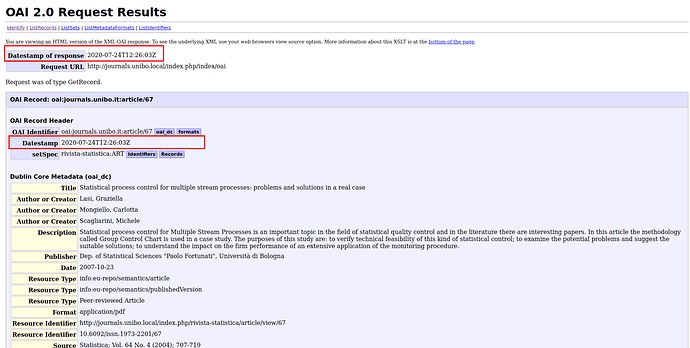Dear all,
recently I’ve migrated OJS from 2.4.8.5 to 3.2.1-1.
I found any problems with OAI exit:
-
When I call /index.php/index/oai?verb=Identify, I find that “Datestamp of response” and “Earliest Datestamp” are quite similar, eg: 2020-07-21T14:00:02Z vs 2020-07-21T14:00:02Z and both the dates show current date.
-
When I call /index.php/index/oai?verb=ListRecords&metadataPrefix=oai_dc, I receive a lot of records with value of “Datestamp” valorized at today date.
These problems make harvesting very difficult and almost useless.
Has anyone experienced similar problems?
Thank you very much.
Antonio
1 Like
Hi @Antonio_Fracasso,
Is your OAI interface enabled? Check the “Distribution” area of Journal Settings.
Regards,
Alec Smecher
Public Knowledge Project Team
Hi @asmecher,
all the OAI interfaces are enabled on our multi journals installation.
We have disabled and re-enabled OAI interfaces but we have the same problem.
Thank you for your help
Regards
Antonio
Hi @Antonio_Fracasso,
…with the article ID in place of 123 for each?
Regards,
Alec Smecher
Public Knowledge Project Team
Hi @asmecher,
OJS runs on mysql.
I’ve checked your query for article ID 67 that it presents the altered datestamp.
OAI record:
Query N.1
SELECT s.* FROM submissions s WHERE s.submission_id=67;
Query N.2
SELECT p.* FROM submissions s JOIN publications p ON (s.current_publication_id = p.publication_id) WHERE s.submission_id=67;
Query N.3
SELECT i.* FROM
submissions s JOIN publications p ON (s.current_publication_id = p.publication_id)
JOIN publication_settings ps ON (ps.publication_id = p.publication_id AND ps.setting_name=‘issueId’)
JOIN issues i ON (i.issue_id = ps.setting_value)
WHERE s.submission_id=67;
We have register that on 8000 oai records, 45% of these show altered datestamp.
Thank you very much!
Regards
Antonio
Hi @Antonio_Fracasso,
I think the issue.last_modified date is the problem – it’s set to null. Could you test whether setting that column starts presenting the datestamp via OAI properly?
Regards,
Alec Smecher
Public Knowledge Project Team
2 Likes
Good day @asmecher
Plz, What are the precedures to fix this error
Regards
Hi @amirtfiha1,
I’m not even sure that Google Scholar uses the OAI interface. Unfortunately you’ll have to ask them.
Regards,
Alec Smecher
Public Knowledge Project Team
@asmecher thank you very much. Your solution works well. Now I’m trying to mapping old data to the new field issues.last_modified.
Thank you very much.
Regards
Antonio
1 Like
